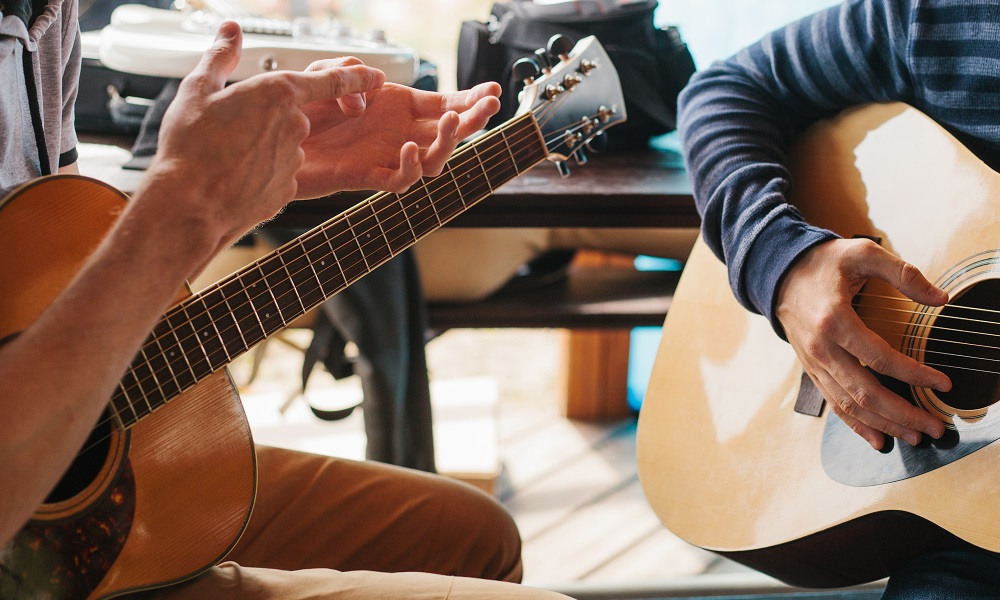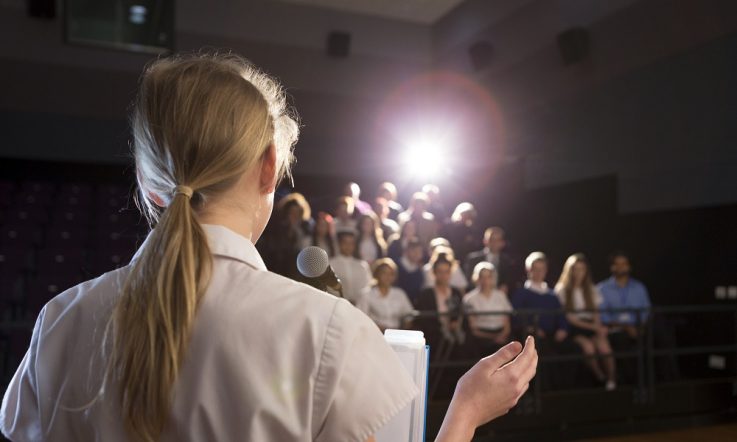Each year, the substantial impact of music educators on students in Australia is recognised with the announcement of the ARIA Music Teacher of the Year award. In the lead up to the awards ceremony in late November, the nominees for 2019 have just been announced, and stretch from early years to post-secondary school educators. In this article, we look at the stories of nominees Antonio Chiappetta, Bel Skinner, Julia Rennick and Lee Strickland.
Antonio Chiappetta – St Andrews College, Sydney, New South Wales
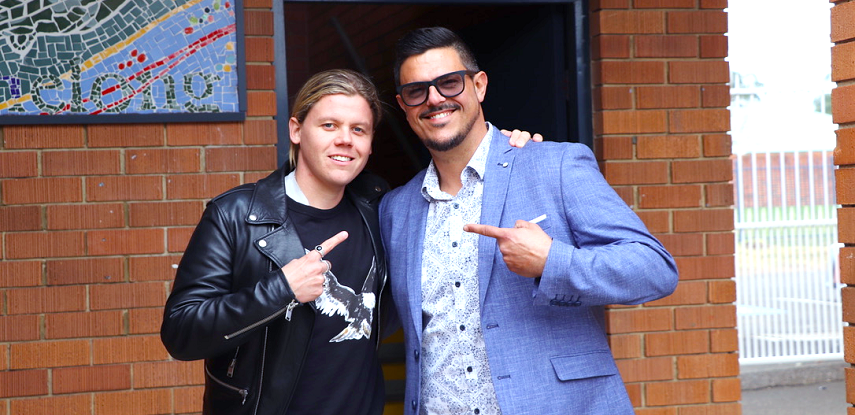
Antonio Chiappetta, right, with musician Conrad Sewell, left, who surprised Chiappetta with the news of his nomination. Image: Supplied
At St Andrews College in Sydney, students look forward to the Creative Acts Night each year. The annual school music festival allows students to perform in a real life setting, and attracts over 2000 people. It is just one initiative of music teacher Antonio Chiappetta, a music educator of over 15 years.
Chiappetta says his music education program at St Andrews College promotes inclusivity and diversity. ‘I pride myself on making music students feel extremely comfortable in their skin. They are sharing vulnerably and passionately whilst exploring their true creative potential.'
He also works in the music industry outside of school, which he says has helped him give students an industry-standard approach to music education.
Bel Skinner – North Regional TAFE, Broome, Western Australia
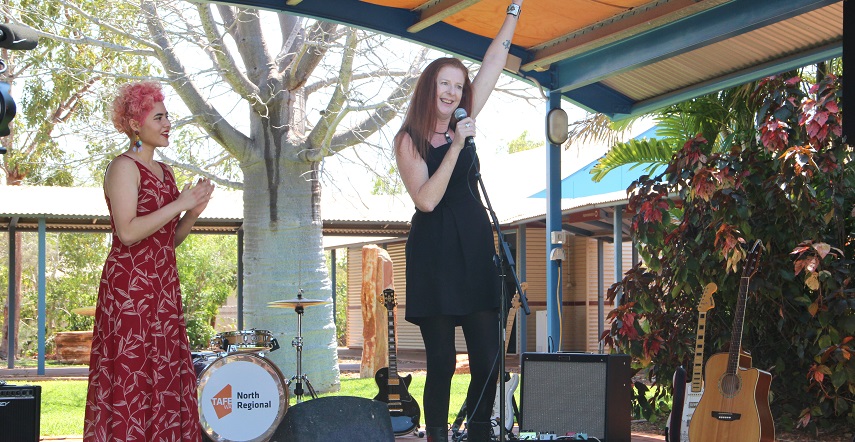
Bel Skinner, right, with musician Montaigne, left, who surprised Skinner with the news of her nomination. Image: supplied.
Seventeen years ago, Bel Skinner began a music program at North Regional TAFE in Broome, Western Australia with three guitar and five at-risk Indigenous students. Now, she's able to serve isolated students across regional and remote areas in the Kimberley and Pilbara regions of Western Australia.
In 2016, Skinner developed a juvenile justice intervention program which used music as the basis to re-engage disengaged youth. All of her music programs have shown to engage disadvantaged students, build their literacy and numeracy skills and promote attendance.
‘I believe that music and music education play a key role in engagement and social change in Indigenous communities across the Kimberley and Pilbara regions,' she says.
Julia Rennick – Gunnedah Conservatorium, Gunnedah, New South Wales
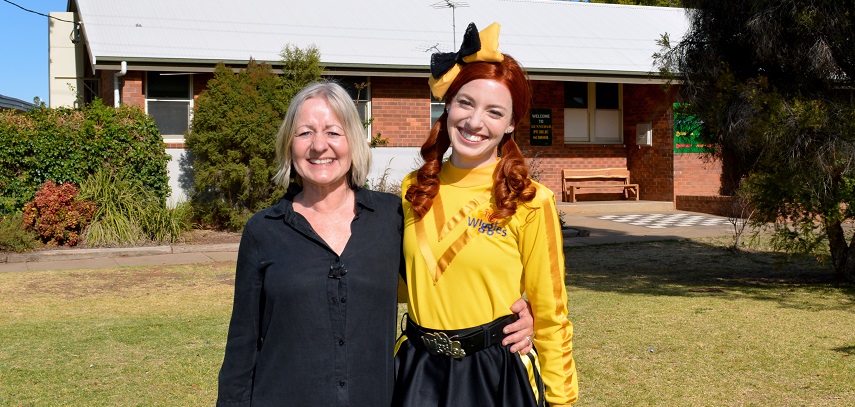
Julia Rennick, left, with performer Emma Watkins, right, who surprised Rennick with the news of her nomination. Image: supplied.
Julia Rennick has delivered the early childhood music program to students at Gunnedah Conservatorium for over 20 years; a program which she says has helped evolve Gunnedah from being a ‘sporty town' to a ‘sporty town that loves music'.
She's passionate about delivering music to the entire community and demonstrates through her work directing plays and teaching music to adults with disabilities. Over the last three years, Rennick has also mentored six generalist teachers through the National Music Teacher Mentoring Program in order to broaden the benefits of music education throughout the town.
‘Research shows that it plays a vital role in a young child's language, social and emotional development. It also develops physical coordination, timing and in my humble opinion, joy – lots of it,' Rennicks says.
Lee Strickland – Narbethong State Special School, Brisbane, Queensland
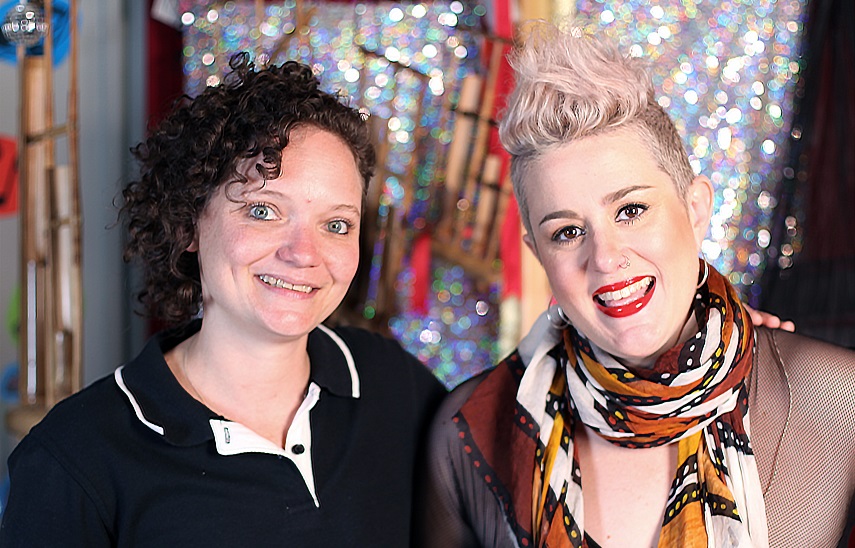
Lee Strickland, left, with musician Katie Noonan, right, who surprised Strickland with the news of her nomination. Image: supplied.
At Narbethong State Special School in Brisbane, music teacher Lee Strickland provides tailored music programs to students with varying degrees of visual, hearing and intellectual impairment. Strickland's music lessons help develop the fine motor skills of students and give them the opportunity to perform.
She translates music into braille and runs individual and group music lessons. She also provides a state-wide service to all music students who are vision impaired, and this year held the first braille music camp in Queensland which helped upskill teachers.
‘I am passionate and driven by all things music and equality,' Strickland says.
The winner of the ARIA Music Teacher of the Year award will be announced on 27 November, and will be decided by public votes. Voting closes on 20 November – to cast a vote, follow the prompts at the ARIA Music Teacher Award website.
Both Antonio Chiapetta and Lee Strickland prioritise giving students the space to perform as part of their music programs.
As a music teacher, how are you fostering a positive performance culture among your students?
